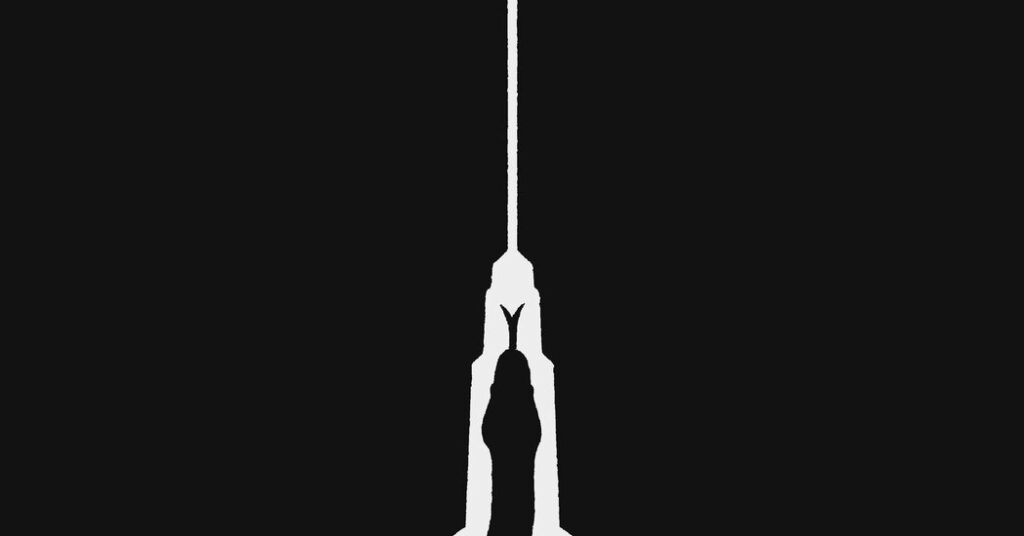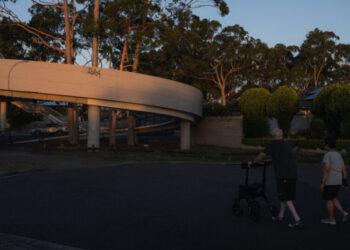Peter Hildebrand choked back tears as he told the crowd about his daughter, Daisy. She was 8 years old when she died in April, one of the two unvaccinated children lost in the measles outbreak that tore through West Texas. “She was very loving,” he told the audience.
It was Day 2 of the annual conference of Children’s Health Defense, the organization of vaccine critics previously led by Robert F. Kennedy Jr., who is now the U.S. health secretary. Mr. Hildebrand had been asked to speak on a panel titled “Breaking the Mainstream Media Measles Narrative” at the conference, which brought 1,000 people to an event center in Austin, Texas, this month.
Mr. Hildebrand spoke about mistrusting Daisy’s hospital doctor, who he said talked to his wife about measles when he was out of the room. “You know, just whenever I wasn’t around, he would sit there and be political about it,” Mr. Hildebrand said.
The panel also featured a woman from the Mennonite community where the Hildebrands live; two Children’s Health Defense leaders; and three current or former doctors. One, Andrew Wakefield, is the British physician who lost his license after falsely linking the measles, mumps and rubella vaccine to autism. Another, Pierre Kory, is a former intensive care physician who, among other things, is a leading promoter of ivermectin as a Covid-19 treatment.
Mr. Hildebrand had granted the organization access to his daughter’s medical records. After reviewing them, Dr. Kory concluded that Daisy hadn’t died of measles, but of a hospital-acquired pneumonia that, he alleged, her medical team had treated incorrectly. This explanation convinced Mr. Hildebrand. He said that he would never bring one of his children to a hospital again and that “if anybody is going to try to force my kids to get the vaccines, they got something else coming.” All of the panelists agreed that the Hildebrands’ story had been misrepresented in national coverage of the measles outbreak.
“The media have a lot to answer for,” said Polly Tommey, a senior Children’s Health Defense staff member on the panel. “I can’t imagine how many women, petrified hearing two girls had died unvaccinated, ran out and got” their kids the measles, mumps and rubella vaccine.
Sitting in the audience, I was moved and fascinated. How had the group’s leadership so successfully earned this man’s trust that he would agree to appear like this in service of their cause? How had mainstream public health and medicine so alienated him? Could Mr. Hildebrand have left the hospital feeling differently — not in any less anguish over the loss of his daughter, but with less anger?
When I shared the experience of watching Mr. Hildebrand with a friend who grew up in an evangelical church, she recognized something immediately. “What he was doing is called testimony,” she said. Testimony, in the tradition she grew up in, is “speaking the story of how you came to your truth, and how it helped you find your life’s purpose,” she explained. It’s about achieving catharsis, community and a calling all at once.
This insight shifted my understanding of what Children’s Health Defense does for people: why it attracts people like Mr. Hildebrand, how it emboldens them to share their stories and how it radicalizes them over time.
Suffering without meaning is very hard for most people to bear. Children’s Health Defense, like religion, helps people put their suffering in context. It offers people explanations that fuse spirituality and science. It suggests that sinister forces are promoting impurity for profit and that purity is achievable through virtuous behavior and righteous action.
For the anti-vaccine group’s devoted acolytes, I can understand why this is healing. And I can understand why traditional medicine — a secular, expert-centered, often impersonal culture — might feel alienating. This isn’t a matter of good science versus cultish belief. It’s a matter of what technocratic leadership can offer and what it can’t, and of people needing something more to tolerate grief and live with trauma in an uncertain world.
***
Children’s Health Defense was founded in 2007 as the World Mercury Project. Its mission, according to its website, is to “end childhood health epidemics by eliminating toxic exposures,” including pesticides and 5G radiation, but it is primarily focused on the alleged harms of vaccines. The organization supports anti-vaccine legislation and research aligned with its ideas, but its greatest impact is in relentless media production: anti-vaccine films, a web-based television channel, a newsletter and social media posts. It is possible to live in a surround-sound Children’s Health Defense universe, and thousands of people do.
Mr. Kennedy was the organization’s board chair, but his relationship with the group is more complicated now than when he was its vocal champion. In 2023, he took a leave to run for president, and a year later he quit altogether in anticipation of being confirmed as health secretary in the Trump administration. The group has never been as close to power as it is today. At the same time, Mr. Kennedy’s Make America Healthy Again agenda is broader than Children’s Health Defense’s priorities, and anti-vaccine ideas — like repealing school mandates or changing guidelines — are the movement’s least popular and most controversial priorities.
The group represents the fringe of the movement that Mr. Kennedy now leads. This puts leaders of the anti-vaccine movement, many of whom advised Mr. Kennedy or worked on his presidential campaign, in a tricky position. Mr. Kennedy has begun to infuse federal policy with his vaccine skepticism, but he hasn’t yet attempted more substantial interventions, like removing the measles, mumps and rubella vaccine from the list of recommended shots. He appears to be trying to thread a needle between what the more zealous members of his base demand and what public opinion will bear. “We need to give Bobby the time to do what he’s trying to do,” Mr. Wakefield told the conference crowd.
This statement struck me as an acknowledgment that the group’s followers are perhaps becoming restive. I went to the conference in part because I was curious how the most militant elements of Mr. Kennedy’s world related to other parts of his coalition, and whether they might be strategically softening their message.
But there was little moderation on display. Senator Rand Paul gave a virtual talk titled “Why Isn’t Tony Fauci in Prison?” A pediatrician spoke about controlling inflammation in kids by preventing their exposure to vaccines, non-organic food, tap water, electromagnetic waves and bad vibes.
In the conference hall, one woman told me about curing her son’s seasonal allergies by exposing him to onions, and another gave me a flier advertising her children’s series (tagline: “They’re trying to kill us. Who’s going to tell the kids?”). A third pitched me on a copper tincture cure-all while explaining how to invest in a cryptocurrency mine her family is involved in. A man shared test tubes filled with what looked like sleek strands of lard. He said they were clots of tissue pulled from the clogged arteries of corpses of people who had died from Covid vaccines.
This didn’t seem like a group interested in adapting to political pressures. There were no question-and-answer sessions, no opportunities for attendees to clarify or contradict. There was only affirmation that this worldview was the truth, that its proponents were courageous truth-seekers and that their connections with one another were critical relationships that would propel them to victory.
This was, then, more of a church service for members than an effort to attract converts or spread the good word. As was true of Peter Hildebrand, nearly everyone I met at the conference had some kind of trauma as the point of entry into the group. In one session, a leader of the organization asked who had a “vaccine injured” family member, and two-thirds of the audience stood. Many were parents who connected their children’s neurodevelopmental disorders, like autism, to vaccination, and many of these parents rejected conventional health recommendations for their families.
The man who showed me the clots supposedly caused by vaccines told me that he’d been dismissed after 36 years in the Air Force for refusing to get vaccinated. Dr. Kory became a Covid contrarian during the pandemic and lost his board certification for promoting ivermectin. This kind of story represents another on-ramp to affiliating with Children’s Health Defense: when a person loses a career or prestige or social identity after being canceled for being a heretic. Those heretics do not cease to exist. They get in a room together and become more convinced of their courage and rightness.
***
Mr. Kennedy attended Daisy Hildebrand’s funeral. “My intention was to come down here quietly to console the families and to be with the community in their moment of grief,” he posted on social media. Mr. Hildebrand told reporters that the health secretary did not challenge his family’s decision not to vaccine their kids.
Mr. Hildebrand and his wife did not lack support when Daisy died; Mennonites are famously communal. But Daisy’s death acquired immediate significance in a national battle about vaccination. Vaccine choices in the current moment are not just matters of weighing evidence, and they are not just personal. They’re freighted with cultural and political implications that invite judgment when things do not go as planned.
I do not know what happened during the Hildebrands’ hospital stay. By many accounts, West Texas public health officials, who know the community well, were doing their very best to mitigate the outbreak without alienating the people they were trying to help. But intense national scrutiny meant that this was not a local matter, and the mainstream media measles narrative, as Children’s Health Defense terms it, felt wrong to the people of Seminole, Texas. The group offered Mr. Hildebrand a way to understand his grief as a wrong done to him rather than a source of regret.
Anti-vaxxers are often characterized as misinformed, and people like Mr. Hildebrand are often characterized as exploited by leaders of Children’s Health Defense when they are vulnerable. But that doesn’t give the people I met at the conference enough credit for the agency they exercise in their lives, or for how sincerely they hold their beliefs. They are there by choice because they accept the group’s worldview. In that world, they feel believed and valued, and are encouraged to think of themselves as brave instead of scared.
Medical culture, in contrast, tends to approach preventable tragedies as teachable moments. This is a mistake. Crises are opportunities to show people what you can do for them, not to ask them to change their minds. Prevention is about risk mitigation; providing people with care and options when they disregard your best advice reduces harm. Effective public health policy should aspire to do both things well.
It isn’t the role of health policymakers or even individual doctors to make meaning for people; the local health department is not supposed to be a source of spiritual succor. But I am thinking hard, after attending this conference, about where spiritual succor is supposed to come from in a technocratic world.
I now understand more viscerally that MAHA and the anti-vaccine movement are growing because they offer people ways to translate their stories into new purpose. Public health and conventional medicine, on the other hand, are only losing people who we might otherwise help. We cannot affirm untrue beliefs, but perhaps we should start listening for new ways to meet people in their moments of need.
Rachael Bedard is a physician and writer in Brooklyn.
The Times is committed to publishing a diversity of letters to the editor. We’d like to hear what you think about this or any of our articles. Here are some tips. And here’s our email: [email protected].
Follow the New York Times Opinion section on Facebook, Instagram, TikTok, Bluesky, WhatsApp and Threads.
The post I Went to an Anti-Vaccine Conference. Medicine Is in Trouble. appeared first on New York Times.




